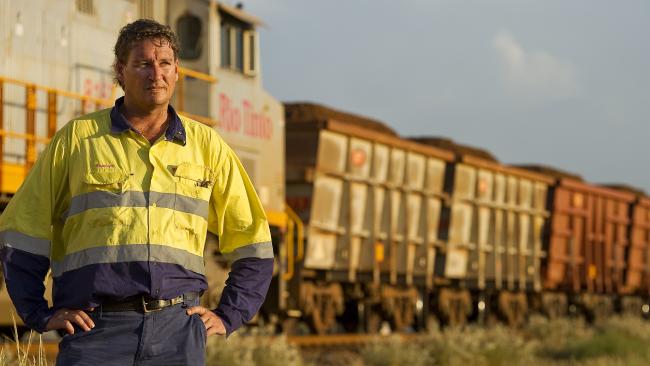
Rio Tinto’s much-vaunted iron ore expansion could be delayed by another two years due to ongoing issues with its driverless train network and could ultimately force the miner to develop more rail infrastructure, chief financial officer Chris Lynch has warned investors and analysts.
In a series of briefings last week following the miner’s interim financial result, Mr Lynch revealed that the train automation issues that prompted it to cut its 2017 iron ore guidance may take two years to address, limiting the amount of ore it can move through its world-leading Pilbara network.
He was “unwilling to rule out the potential for fatal flaws in the system”, according to analysts at Macquarie, with software problems the key driver behind the delay.
Mr Lynch’s comments suggest the issues run deeper and will take longer to resolve than first thought and mean Rio will battle to produce more than 340 million tonnes of iron ore in each of 2017 and 2018, capping its ability to take advantage of what appears to be improving conditions for iron ore prices.
According to Credit Suisse analyst Paul McTaggart, Mr Lynch flagged that the company would need to invest in more rail capacity in the Pilbara if the driverless train program could not be delivered.
Mr McTaggart said he expected Rio would need to add more passing loops to the rail network if the AutoHaul problems could not be rectified. Credit Suisse has cut its 2018 iron ore production forecast for Rio’s Pilbara mines to 345 million tonnes, and does not expect AutoHaul to be running to plan until 2019.
Macquarie has similarly kept its 2017 production forecast at 335 million tonnes and its 2018 forecast at 341 million tonnes to reflect the risk around the automation program.
Rio Tinto revealed in May that glitches in the train automation program, dubbed AutoHaul, would cost the company up to 30 million tonnes of iron ore export capacity this year.
Rio Tinto is spending $US518 million on the program that aims to convert its entire Pilbara rail fleet of 180 locomotives into driverless trains.
The AutoHaul program promises to squeeze more capacity out of the Pilbara rail network by eliminating the need for driver changeovers. Stopping and restarting the enormous iron trains costs Rio Tinto up to an hour per train.
The rail network is not the only bottleneck facing Rio in meeting its 360 million tonne target, with the company also needing to develop more mine capacity to hit that level. The miner recently approved the development of its Silvergrass mine but that would only take output to around 340 million tonnes, Credit Suisse said, meaning the company would need to give its planned Koodaideri mine the go-ahead.
“Work on the possible configuration of Koodaideri is ongoing and Lynch noted that it could range from 20mtpa to 70mtpa,” Mr McTaggart wrote.
The price of iron ore delivered to the Chinese port of Qingdao has climbed from $US48.18 a tonne in early June to more than $US60 a tonne in recent days.
